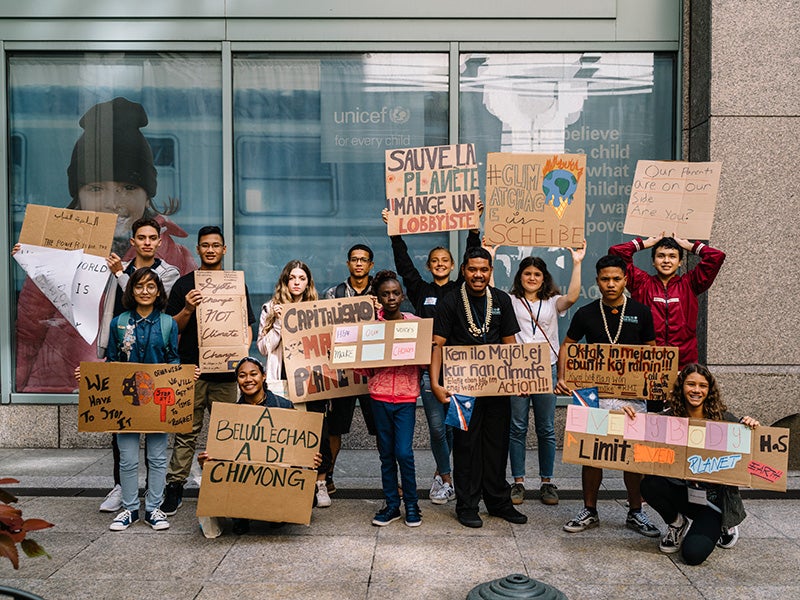Greta and 15 Kids Just Claimed Their Climate Rights at the UN
Sixteen youths, including Swedish climate activist Greta Thunberg, are calling out countries for violating the human rights of children everywhere.

This page was published 6 years ago. Find the latest on Earthjustice’s work.
Sixteen young people from around the world brought a legal complaint about climate change to the United Nations today. Their petition outlines how their human rights are being violated by the failure of nations to seriously address the climate crisis. Earthjustice and global law firm Hausfeld are representing the 16 youths in this matter.
Why are young people filing this petition now?
Time is running out to make the changes necessary to avoid permanent, catastrophic changes to the planet’s climate. Young people are among the most vulnerable to the effects of climate change, and they will bear the burden far greater and longer than today’s adults. In response, youth around the world have started a movement aimed at getting global leaders to take this threat seriously. The petition to the United Nations marks one effort to highlight the obligations of adults to step up.
Has this ever been done before?
No, this is the first time that children have filed a formal complaint about climate change under the United Nations Convention on the Rights of the Child. However, young people — including one of these petitioners — have launched similar legal cases seeking climate change relief in the courts of their home countries.
What is the goal of the petition?
The goal of the petition is to get nations to combat climate change to the fullest and fastest extent possible. The petitioners are not seeking money; they want action.
To bring this about, the petition names five countries whose efforts to date have been too slow and too weak to prevent a climate catastrophe. These countries — Argentina, Brazil, France, Germany, and Turkey — have all ratified the UN Convention on the Rights of the Child. Under that international treaty, countries have specific obligations to provide for the health and well-being of children. These obligations aren’t being met as the climate crisis intensifies.
The petitioners filed a complaint to the UN body that oversees compliance with the treaty. The young people are asking this body to make specific recommendations to the five nations about what they need to do to meet their treaty obligations. Those recommendations to the countries include changing their laws to speed up the response to climate change and applying more diplomatic pressure on big polluters like the United States and China.
Why these five countries?
Every country except the United States has ratified the UN Convention on the Rights of the Child. Of those countries, 45 agreed to an additional protocol that allows children to petition the UN directly about treaty violations. Within that group of 45 nations, Argentina, Brazil, France, Germany, and Turkey are pumping out some of the most pollution that causes climate change. None of the five is on a path needed to keep the planet from heating to 1.5 or 2 degrees Celsius.
The petition is clear, however, that all countries must also work together on this problem.
Who are the petitioners?
The petitioners are 16 young people from Argentina, Brazil, France, Germany, India, the Marshall Islands, Nigeria, Palau, South Africa, Sweden, Tunisia, and the United States. They are all younger than age 18, with the youngest being 8. All the youths are alarmed by the changes they see in their corner of the world, highlighting the global scale of the crisis.
Why is Earthjustice involved?
Earthjustice is determined to move the world as fast as possible to zero carbon emissions and 100% clean energy, an effort we call Zero To 100. Our most important lever for change is the law: We pressure governments in the media, in court, and in global institutions to live up to the legal commitments they make.
Our International program has broad experience bringing matters before international bodies. Our work has put pressure on governments to save the Great Barrier Reef, the Sundarbans mangroves, Glacier National Park, and Alaskan rivers crucial to Indigenous communities.
What happens next?
The complaint goes to the UN Committee on the Rights of the Child. The group is made up of 18 independent child rights experts. The Committee will determine if the complaint is admissible and, if so, will gather responses from the countries named in the complaint. The Committee will then make recommendations to those nations.
While the recommendations are not legally binding, these nations have committed to follow the recommendations. The obligations spelled out under the Convention on the Rights of the Child are binding.
This material is distributed by Earthjustice on behalf of Greta Thunberg, Alexandria Villasenor, Carl Smith, Catarina Lorenzo, Chiara Sacchi, Ellen-Anne, Iris Duquesne, Raina Ivanova, Raslene Joubali, Debby Adegbile, Ayakha Melithafa, Ridhima Pandey, Carlos Manuel, Litokne Kabua, David Ackley III, and Ranton Anjain. Additional information is available at the Department of Justice, Washington, D.C.
The International Program partners with organizations and communities around the world to establish, strengthen, and enforce national and international legal protections for the environment and public health.